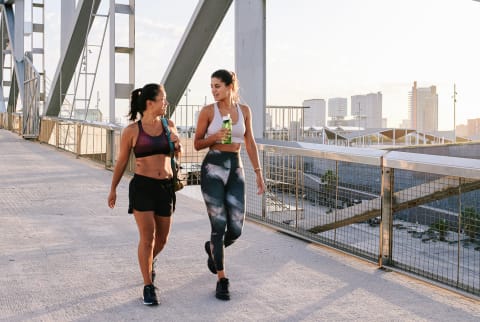Advertisement
Yes, Walking Can Improve Your Digestion

Ray Bass is the associate movement and wellness editor at mindbodygreen and a NASM-Certified Personal Trainer. She holds a degree in creative writing from the University of Pennsylvania, with honors in nonfiction.

As multiple sources will tell you, there are over 70 million people in the U.S. struggling with one or more digestive issues. That's one in every five people.
And while this number is shocking, it's also not shocking. With 95% of us being fiber deficient1 and many folks still adhering to a standard American diet, it's no wonder digestion troubles are running amok. From constipation to IBS (yes, they're different) to leaky gut, acid reflux, and even bloating, this digestive epidemic has to be stopped.
It's well documented that exercise can help improve your digestion, but, contrary to belief, you don't have to be out of breath and sweaty to do so. One of the best exercises for digestion is right under our noses (read: a few feet beneath our noses): walking.
Here's why.
The impact of walking on digestion.
It seems almost too simple—walking is a basic form of human transportation, something most people learn at a young age—but it can make a real difference. Experts agree that walking, in general, is important, but if you have digestive issues, it's especially worth doing.
"Walking is a great way to improve overall health, including digestion," says Jaime Schehr, N.D., R.D. "Regular exercise can actually help strengthen your digestive tract. The amount of blood diverted from your digestive system decreases because your muscles are more efficient when you exercise."
And if you live and breathe gut health, you'll be tickled to hear that walking also boosts your microbiome. "Beyond improving digestion and motility of the GI tract, walking also helps the good bacteria in your microbiome flourish so that they can continue to help you in many other ways," says Marvin Singh, M.D.
In other words, walking is a low-effort action we can take to better our bodies. Did we mention it's also free?
The best time of day to walk for better digestion.
If you're wondering when you should walk to maximize your results—pre-food or post-food—experts claim it's a matter of personal choice. Whatever makes you feel best is best.
"When to walk is a very personal decision," Schehr notes. "Some people prefer to walk after they eat and others before. I will say, though, that if you're walking too close to a meal, you may experience digestive distress."
Singh echoes this POV, adding that any and all walking is beneficial.
"Honestly, I personally think just walking, period, is good. Better to walk sometime than no time. However, I often prefer to walk after meals. It helps me digest the food and feel great after a nice healthy meal."
What else you should know.
If you're not a fan of walking, you can sleep easy knowing that exercise, in general, tends to have possible effects on digestion. The only cause for concern is HIIT, which, while gaining in popularity and praised for its trove of benefits, can cause extreme stress on your body—especially if you don't take time to recover. For those struggling with gut woes, Singh recommends a mixture of cardiovascular exercise and weight training.
"I wouldn't suggest doing high-intensity interval training or running a marathon in order to improve your digestion of a meal."
We can't speak for you, but we think we can manage that.